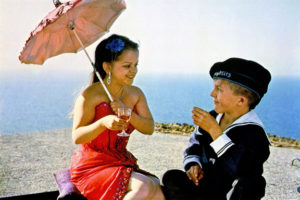 Schlöndorff does his best to remain faithful to Grass’s mordant picnic satire. Grass was pleased: “In Schlöndorff, I found a true interlocutor, someone who provoked me with his questions, who delved into the heart of the subject, and who, during our dialogue, forced...
Schlöndorff does his best to remain faithful to Grass’s mordant picnic satire. Grass was pleased: “In Schlöndorff, I found a true interlocutor, someone who provoked me with his questions, who delved into the heart of the subject, and who, during our dialogue, forced...
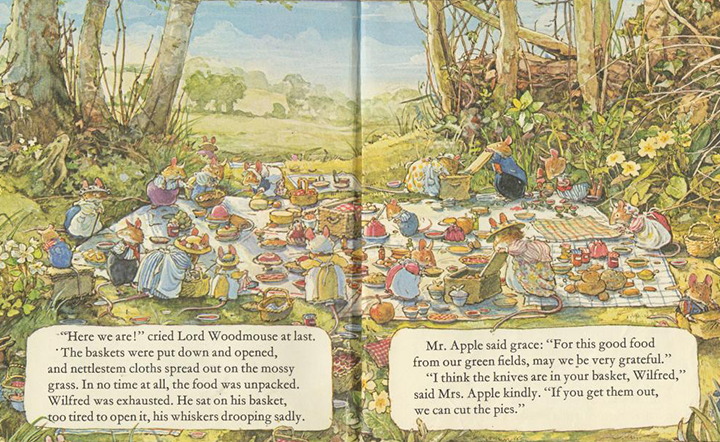 Wilfred Toadflax’s surprise birthday is a picnic feast of cakes, pies, jellies, and fruits. It’s the kind of high-carb meal that makes your teeth hurt. Mr. Apple’s grace suggests that the food is local, but not as he suggests from “our green...
Wilfred Toadflax’s surprise birthday is a picnic feast of cakes, pies, jellies, and fruits. It’s the kind of high-carb meal that makes your teeth hurt. Mr. Apple’s grace suggests that the food is local, but not as he suggests from “our green...
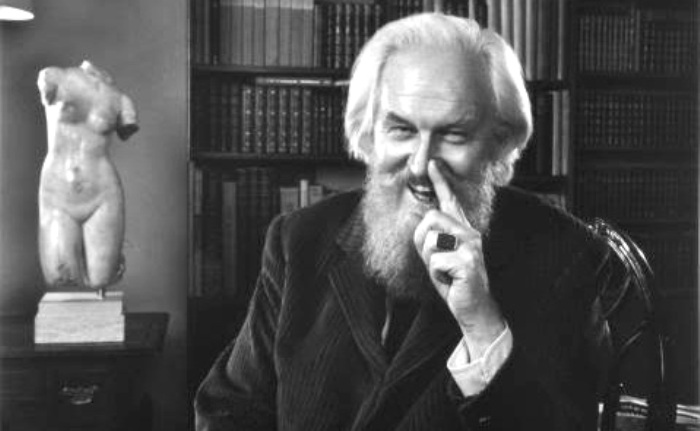 Davies’s picnic wit is a metaphor in is this advice about sexual mores to an assembly at his daughter’s school: “A girl who thinks love affairs are less trouble than a marriage is probably also the kind of girl who thinks that picnics are simpler than dinner parties....
Davies’s picnic wit is a metaphor in is this advice about sexual mores to an assembly at his daughter’s school: “A girl who thinks love affairs are less trouble than a marriage is probably also the kind of girl who thinks that picnics are simpler than dinner parties....
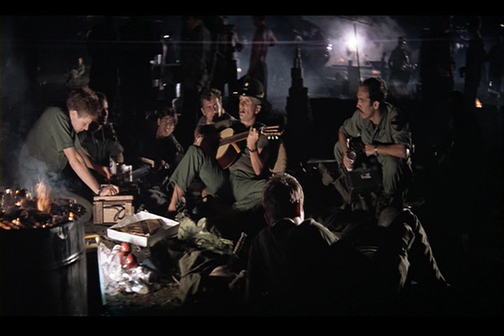 Coppola’s Apocalypse Now is inspired by Conrad’s The Heart of Darkness. Coppola adapted the action and characters to his conception of the “insane” war in Vietnam, and the beach party picnic is his addition to the narrative. Coppola ensures...
Coppola’s Apocalypse Now is inspired by Conrad’s The Heart of Darkness. Coppola adapted the action and characters to his conception of the “insane” war in Vietnam, and the beach party picnic is his addition to the narrative. Coppola ensures...
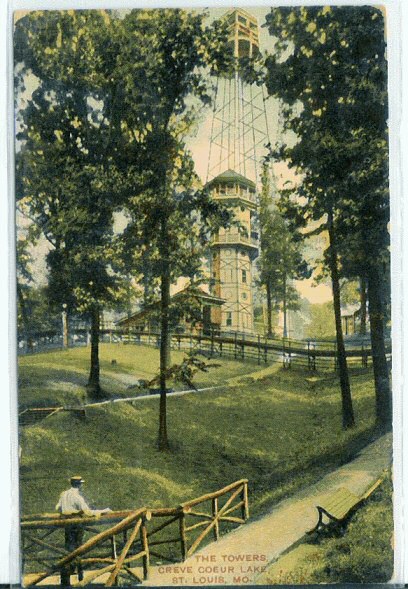 Williams’s A Clear Day for Creve Coeur (1979) is so anti-picnic that it ends the action before the picnic begins. The play’s title is a pun on the French creve coeur, which means heartbreak. In the middle or late 1930s, Creve Coeur was an active amusement...
Williams’s A Clear Day for Creve Coeur (1979) is so anti-picnic that it ends the action before the picnic begins. The play’s title is a pun on the French creve coeur, which means heartbreak. In the middle or late 1930s, Creve Coeur was an active amusement...
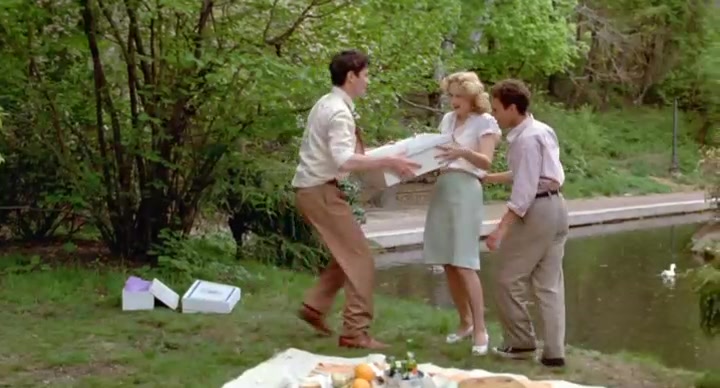 Brooklyn’s Prospect Park is where Sophie Zawistowska is sometimes picnicked. Stingo, the narrator, associates Sophie’s park outings as one of Watteau and Fragonard a fête champêtres. He supposes that it was a “pleasant game” for Sophie to buy...
Brooklyn’s Prospect Park is where Sophie Zawistowska is sometimes picnicked. Stingo, the narrator, associates Sophie’s park outings as one of Watteau and Fragonard a fête champêtres. He supposes that it was a “pleasant game” for Sophie to buy...
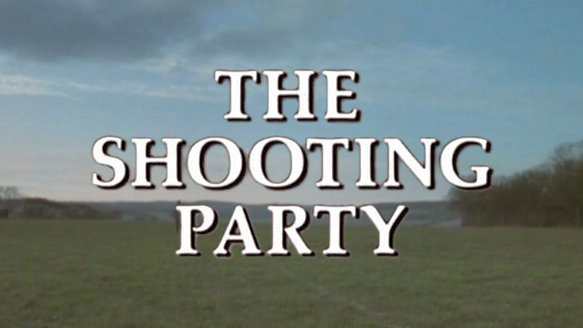 Colgate’s The Shooting Party is a snapshot of English gentry circa October 1913 when Sir Randolph and Minnie Nettleby, the lord and lady of the manor, host one of their traditional fall shooting parties. A halt accompanies it on the hunt or midday break for luncheon....
Colgate’s The Shooting Party is a snapshot of English gentry circa October 1913 when Sir Randolph and Minnie Nettleby, the lord and lady of the manor, host one of their traditional fall shooting parties. A halt accompanies it on the hunt or midday break for luncheon....
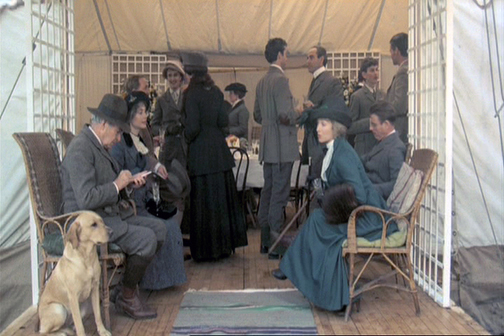 Bridges’s hunt picnic is faithful to Isabel Colegate’s gently melancholy novel of English gentry circa 1913, The Shooting Party. The title The Shooting Party is intended to suggest the larger “shooting party” of the looming world war. Though they know it, Sir...
Included in Varley’s “Picnic on the Nearside is a romantic picnic on the Moon. Fox Carnival Joule and Halo are pals. But their relationship is altered when Halo changes into a woman with full breasts, curves, “the works,” etc. To avoid the sexual...
Bridges’s hunt picnic is faithful to Isabel Colegate’s gently melancholy novel of English gentry circa 1913, The Shooting Party. The title The Shooting Party is intended to suggest the larger “shooting party” of the looming world war. Though they know it, Sir...
Included in Varley’s “Picnic on the Nearside is a romantic picnic on the Moon. Fox Carnival Joule and Halo are pals. But their relationship is altered when Halo changes into a woman with full breasts, curves, “the works,” etc. To avoid the sexual...
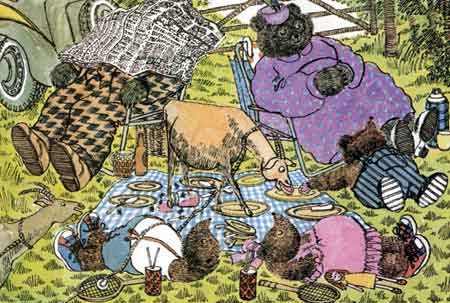 Picnic is the euphemism for a daylong eating orgy in Gordon’s Wilberforce Goes on a Picnic (1982). It’s the story of obese bears and a goat, who collectively devour mounds of hamburgers on rolls, sandwiches, a jar of catsup, a bowl heaped with mashed...
Picnic is the euphemism for a daylong eating orgy in Gordon’s Wilberforce Goes on a Picnic (1982). It’s the story of obese bears and a goat, who collectively devour mounds of hamburgers on rolls, sandwiches, a jar of catsup, a bowl heaped with mashed...










